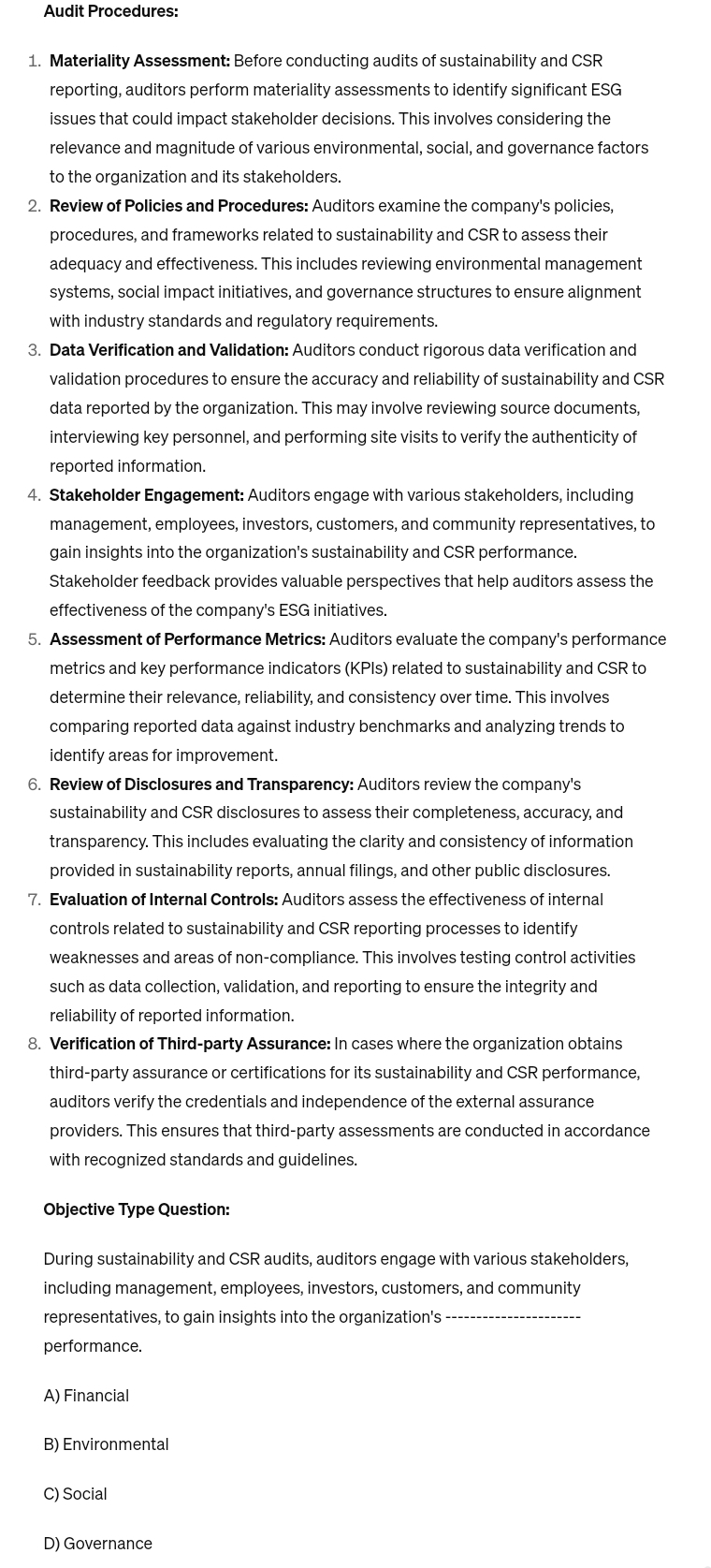Answered step by step
Verified Expert Solution
Question
1 Approved Answer
Audit Procedures: Materiality Assessment: Before conducting audits of sustainability and CSR reporting, auditors perform materiality assessments to identify significant ESG issues that could impact stakeholder
Audit Procedures:
Materiality Assessment: Before conducting audits of sustainability and CSR reporting, auditors perform materiality assessments to identify significant ESG issues that could impact stakeholder decisions. This involves considering the relevance and magnitude of various environmental, social, and governance factors to the organization and its stakeholders.
Review of Policies and Procedures: Auditors examine the company's policies, procedures, and frameworks related to sustainability and CSR to assess their adequacy and effectiveness. This includes reviewing environmental management systems, social impact initiatives, and governance structures to ensure alignment with industry standards and regulatory requirements.
Data Verification and Validation: Auditors conduct rigorous data verification and validation procedures to ensure the accuracy and reliability of sustainability and CSR data reported by the organization. This may involve reviewing source documents, interviewing key personnel, and performing site visits to verify the authenticity of reported information.
Stakeholder Engagement: Auditors engage with various stakeholders, including management, employees, investors, customers, and community representatives, to gain insights into the organization's sustainability and CSR performance.
Stakeholder feedback provides valuable perspectives that help auditors assess the effectiveness of the company's ESG initiatives.
Assessment of Performance Metrics: Auditors evaluate the company's performance metrics and key performance indicators KPIs related to sustainability and CSR to determine their relevance, reliability, and consistency over time. This involves comparing reported data against industry benchmarks and analyzing trends to identify areas for improvement.
Review of Disclosures and Transparency: Auditors review the company's sustainability and CSR disclosures to assess their completeness, accuracy, and transparency. This includes evaluating the clarity and consistency of information provided in sustainability reports, annual filings, and other public disclosures.
Evaluation of Internal Controls: Auditors assess the effectiveness of internal controls related to sustainability and CSR reporting processes to identify weaknesses and areas of noncompliance. This involves testing control activities such as data collection, validation, and reporting to ensure the integrity and reliability of reported information.
Verification of Thirdparty Assurance: In cases where the organization obtains thirdparty assurance or certifications for its sustainability and CSR performance, auditors verify the credentials and independence of the external assurance providers. This ensures that thirdparty assessments are conducted in accordance with recognized standards and guidelines.
Objective Type Question:
During sustainability and CSR audits, auditors engage with various stakeholders, including management, employees, investors, customers, and community representatives, to gain insights into the organization's performance.
A Financial
B Environmental
C Social
D Governance

Step by Step Solution
There are 3 Steps involved in it
Step: 1

Get Instant Access to Expert-Tailored Solutions
See step-by-step solutions with expert insights and AI powered tools for academic success
Step: 2

Step: 3

Ace Your Homework with AI
Get the answers you need in no time with our AI-driven, step-by-step assistance
Get Started


